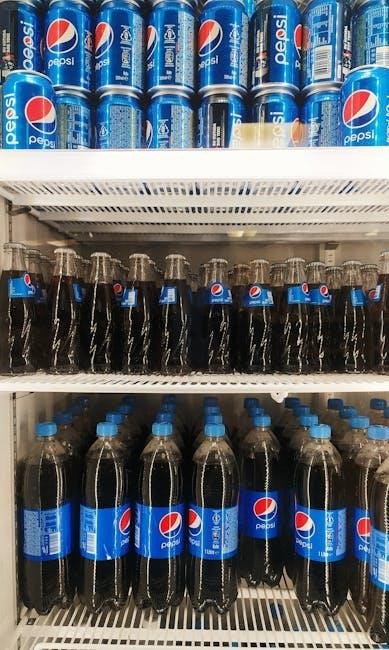Proper refrigerator storage is crucial for maintaining the potency and safety of certain medications, ensuring they remain effective and stable over time. This section highlights the importance of correct storage practices for temperature-sensitive drugs, providing a clear understanding of why refrigeration is essential for specific pharmaceutical products.
Overview of Refrigerated Medications
Refrigerated medications are pharmaceutical products that require controlled storage at specific low temperatures to maintain their stability, potency, and safety. These drugs, such as vaccines, insulin, and certain biologics, are sensitive to heat and humidity, which can degrade their active ingredients if not stored properly. Proper refrigeration ensures these medications remain effective and prevents degradation, which could lead to reduced efficacy or even harmful reactions. Common examples include vaccines, insulin pens, and eye/ear drops, all of which must be kept within a narrow temperature range (typically 2°C to 8°C). Refrigeration also extends the shelf life of these products, safeguarding their therapeutic benefits. Always consult the product’s labeling or manufacturer’s guidelines for precise storage instructions, as improper storage can compromise their effectiveness.
Importance of Proper Drug Storage
Proper drug storage is essential to ensure the safety, efficacy, and stability of medications. Improper storage can lead to degradation of active ingredients, reducing a drug’s potency or even rendering it ineffective. This can result in inadequate treatment, potential health risks, or adverse effects. Refrigeration, in particular, is critical for temperature-sensitive drugs, as exposure to heat or humidity can cause irreversible chemical changes. Additionally, proper storage extends the shelf life of medications, preventing waste and ensuring continuous therapy. Always follow the manufacturer’s guidelines to maintain the quality and safety of refrigerated drugs, as improper handling can compromise patient care and treatment outcomes.

Common Types of Drugs Requiring Refrigeration
- Vaccines and biological products
- Insulin and diabetes medications
- Eye and ear drops
- Certain antibiotics and anticoagulants
- Specific biologic therapies
Vaccines and Biological Products
Vaccines and biological products are highly sensitive to temperature fluctuations, making refrigeration essential to maintain their potency and effectiveness. These products, such as certain vaccines and immunoglobulins, are often derived from living organisms and require strict temperature control to prevent degradation. Refrigeration typically occurs between 2°C and 8°C, ensuring the integrity of these medications. Improper storage can lead to loss of efficacy, making them unsafe for use. Additionally, some biological products, like insulin, must be stored in the refrigerator to maintain their stability. Proper handling during transportation and storage is critical to ensure these life-saving medications remain effective. Always check expiration dates and follow manufacturer guidelines for specific storage requirements.
Insulin and Diabetes Medications

Insulin and certain diabetes medications require refrigeration to maintain their potency and ensure proper glucose regulation. These medications, such as rapid-acting and long-acting insulins, are temperature-sensitive and must be stored between 2°C and 8°C to prevent degradation. Once opened, some insulins can be kept at room temperature for a limited time, but unopened vials or pens must remain refrigerated. Improper storage can lead to reduced efficacy, potentially causing blood sugar fluctuations. Always check the expiration date and follow the manufacturer’s specific storage instructions. Proper handling and storage of these medications are vital for effective diabetes management and patient safety.

Eye and Ear Drops
Eye and ear drops often require refrigeration to maintain their sterility and potency. Many ophthalmic and otic preparations are sensitive to temperature fluctuations, which can degrade their active ingredients. Refrigeration helps prevent microbial growth and ensures the medication remains effective. Once opened, some drops may be stored at room temperature for a limited period, typically up to 28 days, but unopened bottles should remain refrigerated. Proper storage is crucial to prevent contamination and maintain the drug’s stability. Always check the expiration date and follow the manufacturer’s instructions for specific storage requirements. Improperly stored eye or ear drops may lose their effectiveness or become unsafe to use, potentially leading to infections or treatment failure.
Specific Examples of Refrigerated Drugs
Certain medications require refrigeration to preserve their efficacy and stability. Examples include insulin and insulin analogs, which must be stored at 2–8°C to maintain their biological activity. Vaccines, such as the influenza and COVID-19 vaccines, also need refrigeration to prevent degradation. Biological products, like growth hormones and monoclonal antibodies, are temperature-sensitive and typically require cold storage. Additionally, some eye drops and ear drops must be refrigerated to prevent microbial contamination and maintain sterility. Drugs like azathioprine for inflammatory bowel disease and tacrolimus ointment for skin conditions also require refrigeration. Always check the expiration date and ensure proper storage conditions to guarantee the medication’s effectiveness. This list highlights common refrigerated drugs, but it is not exhaustive, and specific storage instructions should be verified for each medication.
Storage Guidelines for Refrigerated Drugs
Refrigerated drugs should be stored at 2–8°C, placed in the main compartment away from direct cooling vents. Use airtight containers and keep medications upright, ensuring they remain stable and effective. Always check expiration dates and avoid freezing unless specified. Proper storage maintains drug potency and safety.

Temperature Requirements

Refrigerated drugs typically require storage at a consistent temperature between 2°C and 8°C to maintain their stability and potency; The refrigerator should be set to this range, avoiding fluctuations, as extreme temperatures can degrade the medication. It’s important to store medications in the main compartment, away from the freezer and direct cooling vents to prevent exposure to freezing temperatures. Regularly monitoring the refrigerator’s temperature ensures compliance with storage requirements. Some medications may have narrower temperature ranges, so always check the specific instructions provided by the manufacturer. Proper temperature control is essential for preserving the effectiveness of refrigerated drugs and ensuring patient safety. Always avoid storing medications in areas with inconsistent or extreme temperature variations. This ensures the drugs remain safe and effective until their expiration date.
Handling and Transportation Tips
When handling refrigerated medications, it’s essential to maintain their temperature stability. Use insulated containers with ice packs during transport to keep drugs within the 2°C to 8°C range. Avoid exposing medications to direct sunlight or heat sources. Never freeze refrigerated drugs unless specified, as this can cause degradation. Always check the temperature of stored medications upon arrival and monitor it during transport. Minimize transportation time to ensure stability. Keep medications away from children and pets during handling. Follow the manufacturer’s guidelines for specific transportation requirements. Proper handling and transport practices are critical to preserving the efficacy of refrigerated drugs and ensuring patient safety. Regularly inspect containers for signs of temperature excursions or damage. Maintain a record of transportation conditions if required. These precautions help guarantee the medications remain effective and safe for use.
Expiration Dates and Stability
Proper storage conditions are vital for maintaining the stability and extending the shelf life of refrigerated medications. Expiration dates on drug labels indicate the manufacturer’s guarantee of potency and safety when stored correctly. Always check expiration dates before storing or administering medications. Improper storage, such as temperature fluctuations, can degrade drugs and reduce their effectiveness. Some medications remain stable without refrigeration until opened, but require refrigeration afterward. Others may degrade rapidly if not kept at the correct temperature. Never use expired or unstable medications, as they may lose potency or become unsafe. Regularly review stored drugs to ensure they are within their expiration dates and have not been compromised by storage conditions. This ensures the medications remain safe and effective for their intended use.

Best Practices for Refrigerator Organization
Organizing a refrigerator for drug storage involves separating medications from food, using labeled containers, and maintaining consistent temperatures to ensure drug stability and safety.
Separating Medications from Food
Separating medications from food in the refrigerator is essential to prevent contamination and maintain drug potency. Store medications in a dedicated, sealed container or ziplock bag to avoid exposure to strong-smelling foods or moisture. Label the container clearly to ensure easy identification. This practice also prevents accidental ingestion of medications by children or pets. Additionally, keeping medications away from food helps maintain a clean and organized storage environment. Always check expiration dates and discard any expired drugs. By separating medications from food, you ensure safety, reduce cross-contamination risks, and maintain the effectiveness of your stored drugs. This simple step is crucial for proper refrigerator organization and adherence to storage guidelines.
Using Proper Containers and Labels
Using proper containers and labels is vital for maintaining the integrity and safety of refrigerated medications. Store drugs in airtight, leak-proof containers to protect them from moisture and contaminants. Label each container clearly with the medication’s name, expiration date, and storage instructions. This ensures quick identification and prevents mix-ups. Consider using compartmentalized bins or organizers to separate medications, keeping them tidy and accessible. Labeling also helps in monitoring expiration dates and ensuring timely disposal of expired drugs. Additionally, if medications are transferred to smaller containers, ensure the labels remain accurate and legible. Proper labeling and container use not only enhance organization but also comply with safety standards, preventing accidental ingestion or misuse.
Monitoring Temperature Consistency
Monitoring temperature consistency is essential to ensure the stability and effectiveness of refrigerated medications. Most drugs require storage at a consistent refrigerator temperature between 2°C and 8°C. Regularly check the refrigerator’s temperature using a reliable thermometer, especially after power outages or adjustments. Avoid placing medications near the freezer or door, as these areas may experience temperature fluctuations. Ensure the refrigerator maintains a stable temperature by keeping it away from direct sunlight or heat sources. Additionally, minimize frequent opening of the fridge to prevent temperature excursions. Documenting temperature readings can help track consistency and ensure compliance with storage requirements. Proper monitoring prevents degradation of temperature-sensitive drugs, maintaining their potency and safety for use.
Special Considerations for Refrigerated Medications
Some medications require frozen storage, while others should not be refrigerated. Always follow manufacturer guidelines for specific drugs, ensuring proper handling during transport and temperature excursions.
Medications Requiring Frozen Storage
Certain medications, such as anthrax immune globulin (Anthrasil) and carmustine wafer (Gliadel), require frozen storage conditions to maintain their potency and stability. These drugs are highly sensitive to temperature fluctuations and must be kept at extremely low temperatures, typically below freezing. Proper handling and storage are critical to ensure their effectiveness, and any deviation from the recommended conditions can compromise their safety and efficacy. It is essential to follow the manufacturer’s guidelines for these specialized medications, as improper storage can lead to degradation or loss of therapeutic properties. Always verify the specific storage requirements for such medications and ensure they are stored in a dedicated freezer unit to meet their unique needs.
Drugs That Should Not Be Refrigerated
While many medications require refrigeration, others should not be stored in the fridge to maintain their stability. Most drugs are designed to remain effective at room temperature (15°C to 30°C) unless specified otherwise. Refrigeration can sometimes cause certain medications to degrade or become less potent. For example, some vaccines and insulin products, while requiring cool storage, may not necessarily need refrigeration if they are in use and within their expiration dates. Always check the medication label or consult a pharmacist to confirm storage requirements. Improper refrigeration can lead to reduced efficacy or even render the drug unsafe. Ensuring medications are stored according to their specific needs is crucial for maintaining their therapeutic properties and patient safety.
Emergency Procedures for Temperature Excursions
In cases where refrigerated medications are exposed to improper temperatures, immediate action is necessary to ensure their safety and efficacy. First, check the temperature history to assess the extent of the excursion. If the medication has been outside the recommended range for an extended period, its stability may be compromised. Contact the manufacturer or a pharmacist for guidance on whether the drug can still be used or if it should be discarded. Document the incident and monitor the medication’s appearance and potency. For critical medications like vaccines or biologics, replacement may be required. Always prioritize patient safety by following professional advice and ensuring future storage conditions remain consistent and monitored.



